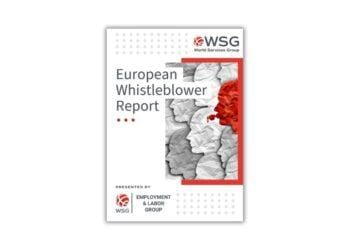Society owes much to whistleblowers. Whistleblowers – herein meaning persons who allege to government authorities (either to civil or law-enforcement agencies or in qui tam lawsuits) specific wrongdoing by or within a private company – play a key role in uncovering, stopping and punishing malfeasance by companies.[1] Whistleblowing can be an honorable undertaking, not only because it is a key weapon against such misconduct, but also because it often requires great courage, given that it may result in retaliation and backlash generally.
However, honor is hardly the only incentive for would-be whistleblowers to overcome their apprehension and report wrongdoing to the government. There is a more prosaic and practical incentive: money.
In some situations, whistleblowers may be eligible for a hefty reward from the government for having provided it with information. Furthermore, whistleblowers stand to gain lucrative recoveries if their companies retaliate against them – typically via demotion or firing – for protected whistleblowing activity; violations of some statutory protections against retaliation are remediable not only by reinstatement and litigation costs, but also by single or even double back pay.
The nature and extent of rewards or protection, if any, varies depending upon, among other things, the industry of the company involved and the nature of the alleged wrongdoing reported; such factors determine the applicability of particular statutes that may – or may not – authorize rewards or remedies in a specific case.
Both of these – rewards for providing information and remedies for retaliation – are prominent features of the much-discussed whistleblower provisions of the Dodd-Frank Act passed last year. Section 922(a) of the Act [2] contemplates either or both, under certain circumstances for qualifying whistleblowers who provide information to the Securities and Exchange Commission (SEC) relating to a violation of the securities laws. These rewards and protections surely have prompted a great many of the reports recently made by whistleblowers to the SEC.
Clearly, given the right circumstances, there are many reasons to blow the whistle. There are also many reasons to think twice before doing so, however. Referring at times specifically to a report made under Section 922(a) – but raising issues common in other contexts as well – the following sets forth five important questions a whistleblower should ask himself or herself to avoid making an uninformed or rash decision.
1. Am I prepared for others to learn that I am a whistleblower?
Some statutes provide for anonymous and/or confidential whistleblowing. For example, Section 922 (a) ensures that whistleblowers can make reports to the SEC anonymously through counsel. Similarly, Section 301 of the Sarbanes-Oxley Act [3] requires that audit committees of issuers establish procedures for confidential, anonymous whistleblowing by employees regarding questionable accounting or auditing. As for statutory qui tam lawsuits, they typically are initially placed under seal, thereby providing confidentiality as against most of the world
Even if particular whistleblowing falls within the ambit of one of these statutes, however, the whistleblower should not expect permanent and complete confidentiality or anonymity. The identity of a supposedly anonymous whistleblower may become suspected – or even confirmed – prematurely in many ways and for many reasons. Moreover, statutes themselves contemplate an end to confidentiality and anonymity. For example, qui tam lawsuits are subject to unsealing, and Section 922(a) requires that a whistleblower’s identity be disclosed, at least to the SEC, before the whistleblower can claim any reward.
Potential whistleblowers therefore should be ready to be recognized, or at least rumored, as the whistleblower. For obvious reasons, such recognition or rumors can prove uncomfortable or worse. Whether they might prove unbearable is a question to ask before blowing the whistle.
2. Am I prepared to forego reporting internally before reporting to the government?
A whistleblower’s eligibility for rewards and protection against retaliation generally does not depend on whether the whistleblower has reported first to the government rather than elsewhere. Accordingly, the whistleblower ultimately may be entitled to a reward and protection even if he or she first reports the alleged wrongdoing internally within the company employing the whistleblower. This is not only advantageous to the company, but also sensible from a policy perspective. Internal efforts to address and fix problems within a company generally should be encouraged, and whistleblowers should have the option of pursuing that route before going to the government.
Whether that option is a good one in a particular case is another matter. Would-be whistleblowers need to weigh the pros and cons of starting with internal reporting. A cynic can see unseemly advantages to internal reporting. For employees of companies that offer rewards for internal reporting, such a reward may seem like lower-hanging (though less valuable) fruit than rewards that will come, if at all, only at the end of a laborious governmental process.
There are more altruistic reasons to report internally first, however. Many employees care about their company and would genuinely like to maximize the company’s opportunities both to sincerely and effectively address problems and to avoid the cost and stigma of a government investigation.
On the other hand, there may be disadvantages to reporting internally. For example, internal reporting could enable a coverup – via document alteration or destruction or witness tampering, for example – prior to the initiation of a government investigation. It also could be intimidating or unpleasant to the reporter due to, for example, a lack of trust in or conflict with the personnel in the internal reporting chain or the prospect of being perceived internally as a “snitch.”
Moreover, cynics note that internal reporting might be squarely contrary to the reporter’s financial interests. Not notifying the company promptly could cause the problem to multiply, resulting in greater damages and scandal; in turn, this may increase both the likelihood of a reward from the government and the size of any reward given.
These and other factors ultimately will determine whether the scales tip in favor of first reporting internally, and they need to be considered.
3. Am I prepared to expend the resources potentially required to earn my reward?
Those seeking a reward under Section 922(a), beware: whistleblowing likely will not prove a simple matter of submitting a report to the SEC and waiting in anticipation of a reward. Instead, the SEC may require considerable effort on the part of a whistleblower. Section 922(a) mandates that prior to payment of an award, the whistleblower “shall provide such other information as the Commission may require, directly or through counsel for the whistleblower.” [4]
Whistleblowers cannot know in advance what information the SEC may seek or how it may seek such information from the whistleblower. At a minimum, on any significant claim the SEC is likely to require multiple thorough interviews with the whistleblower, and these should all be preceded by thorough debriefing and preparation by the whistleblower’s counsel.
Moreover, the SEC conceivably could require the whistleblower to provide information to other government agencies, such as the Federal Bureau of Investigation. Indeed, Section 922(a) specifically authorizes the SEC to share the whistleblower’s information with federal, state or foreign government authorities, whether regulatory or law enforcement. In furtherance of such “sharing,” the SEC may ask the whistleblower to participate actively in providing information to other agencies.
Whistleblowers may be daunted by the required elbow grease, not to mention the expenditure of time and, for whistleblowers lacking a contingency fee arrangement, money.
In short, the quest to obtain a reward could involve substantial investment of many personal and financial resources of the whistleblower, with no guaranteed return on the investment. Whistleblowers should assess whether they are willing to make that investment.
4. Am I prepared to establish my entitlement to a reward?
Satisfaction of the SEC’s demand for information is not the only prerequisite to claiming a reward. A whistleblower, having worked to provide the SEC with the information it sought, may have to work harder to establish the satisfaction all requirements for obtaining a reward. There are several requirements, both positive and negative.
The positive requirements include: (1) that the whistleblower’s “original information”; (2) led to a recovery of at least $1 million in an SEC or “related” action.
The negative requirements are that the whistleblower must not: (1) fit within a category of persons ineligible for the reward, such as employees of a law enforcement organization or certain whistleblowers who gained the information through performance of an audit; (2) have been convicted of a criminal violation related to the SEC action; or (3) have failed to submit information to the SEC in such form as the SEC requires.
The nuances of these requirements are beyond the scope of this article, but they exist and could prove vexing in particular cases. Suffice it to say that the whistleblower may have to convince the SEC that all requirements have been satisfied, and must ask himself or herself whether she is ready to do so if and when necessary.
5. Am I prepared to live with all possible consequences of the entire investigation my reporting may unleash?
Once shown in through the front door, the government may not stay in the foyer. Instead, it may start to look in any number of rooms in the house. A potential whistleblower needs to understand that the government may not limit its investigation to the narrow confines of the whistleblower’s original allegations. Instead, the investigation could expand, at the government’s discretion, to a range of related or even unrelated matters. Moreover, the investigation ultimately may involve not only the original government agency receiving the allegations, but also additional, unanticipated agencies.
Some whistleblowers may welcome this investigative expansion, for any number of reasons. They may relish the thought of thorough house cleaning and the discovery of additional misdeeds within the company. There are potential drawbacks, however.
A whistleblower pointing the finger elsewhere within the company may find that the investigation leads uncomfortably close to his or her own niche in the company; if so, whether the whistleblower has anything to hide, he or she may experience the fear, mistrust and inconvenience often visited upon even innocent employees of companies under investigation.
Even after the investigation is over, the whistleblower – especially one who is and will remain a company employee – may experience undesirable consequences of an investigation of unexpectedly broad scope. For instance, the company could overreact by imposing excessive compliance requirements across the board, multiplying company red tape and unrealistically raising compliance expectations for all employees.
A prospective whistleblower cannot know in advance whether the consequences of an investigation as a whole will prove beneficial on balance. That will depend upon the ultimate scope of the investigation, as well as the whistleblower’s personality, objectives and motivations. He or she should know, however, that the ultimate scope of an investigation, and its resulting ramifications, cannot be predicted. The question is whether the whistleblower can accept such significant uncertainties.
Conclusion
Society as a whole can reap benefits from whistleblowing, using it as a tool to fight misdeeds by or within private enterprise. Whistleblowing, whether in qui tam complaints or to government enforcement agencies, offers whistleblowers the potential for great rewards for both the pocketbook and the conscience. Before rushing to pursue such rewards, however, would-be whistleblowers should stop and consider the overall desirability of taking such a serious step. Such consideration might begin with an introspective examination of the five questions discussed above.
[1] “Whistleblower” has no universal definition; the definition varies depending upon the context involved or the statute defining the term. The definition used herein is designed to facilitate comprehension of the particular concepts discussed herein. The definition includes persons not employed by the companies which are the subject of the allegations, although often whistleblowers in fact are employees of such companies. [2] Section 922(a) is codified at 15 U.S.C. § 78u-6. [3] Section 301 is codified at 15 U.S.C. § 78j-1. [4] 15 U.S.C. § 78u-6










